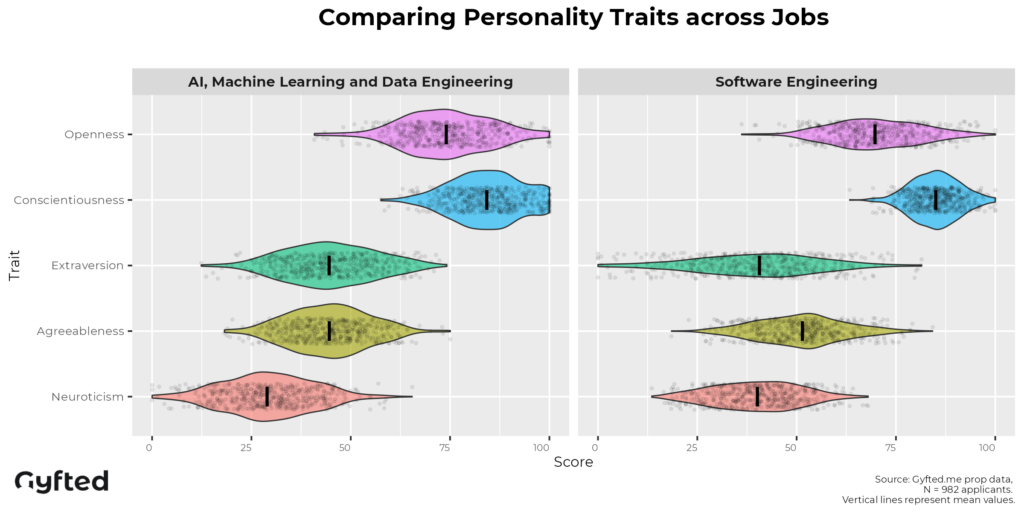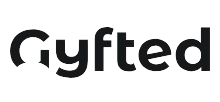AI, Machine Learning, and Data Engineering (AI/ML/DE) roles and Software Engineering jobs are crucial in tech at large. Below we explore the personality differences between AI engineers and software engineers based on data from Gyfted. Understanding certain distinctions between these can provide relevant insights for team building and talent development, especially around retention.
The data presented is derived from Gyfted’s recruitments involving 982 applicants across AI, Machine Learning, and Data Engineering roles and Software Engineering positions. We measured 5 core personality traits: Openness, Conscientiousness, Extraversion, Agreeableness, and Neuroticism, using the Five Factor model assessment [plus other assessments].

AI Engineer & Data Engineer vs Software Engineer Personality Insights
- Openness: AI/ML/DE professionals show a notably higher level of openness compared to Software Engineers. This suggests that AI/ML/DE roles attract/require individuals who are more receptive to new ideas and novelties – possibly due to the rapidly changing nature in AI.
- Conscientiousness: both groups have very similar, high levels of conscientiousness. Both roles require detail-oriented and organized individuals, with AI/ML/DE possibly demanding even more precision in data handling and algorithm development as we can seen in the extreme (high) distribution of results of that trait.
- Extraversion: AI/ML/DE professionals have lower levels of extraversion compared to Software Engineers. This could reflect the more research-oriented and data-focused nature of AI/ML/DE work, which may attract more introverted individuals. The field has many mathematicians, physicists, and technical theoretically educated folk, who tend to quite introverted relative to other technical fields.
- Agreeableness: Software Engineers show a marginally higher level of agreeableness. However, many of the SW engineers recruited were for junior and mid roles — which we expect captures a wider group in terms of personality diversity. Empirical data shows the best senior engineers are very disagreeable, and we’ll have to perform many such recruitments before updating this data.
- Neuroticism: AI/ML & data engineers display slightly lower levels of neuroticism compared to Software Engineers. This indicates that AI/ML/DE roles attract individuals who are more emotionally stable, perhaps to handle the uncertainties and challenges often associated with cutting-edge tech fields?
Implications for Hiring
- When hiring for AI/ML/DE roles, prioritize candidates with very high curiosity and high openness.
- For SW Engineering positions, look for a balance of traits, with particular attention to low agreeableness.
- Use personality and cognitive assessments as part of the hiring process for these technical roles to improve retention via better matching for ‘fit’.
The nature of AI & software development work
AI, Machine Learning, and Data Engineering work often involves:
- Developing and implementing complex algorithms and data pipelines
- Researching, cleaning, analyzing and interpreting large datasets
- Staying on top of very rapidly evolving AI technologies and research
- Balancing theoretical knowledge with practical application – this is especially becoming more popular with domain experts (eg. in legal, chemistry, medicine, mettalurgy et al) switching into AI engineering and data science
- Collaborating with diverse teams of researchers, domain experts and software developers
Software Engineering roles focus on:
- Systems architecture and infrastructure
- Developing and maintaining software applications
- Implementing user-facing features
- Ensuring code quality and system reliability
- Following established software development methodologies
AI/ML & Data Engineering, and Software Engineering roles attract professionals with slightly different personality profiles (but still closer to one another than ‘further apart’ as in the case of distinct functions, like for example Sales and Customer Success). AI/ML/DE professionals tend to score higher in openness and conscientiousness, and lower in extraversion and neuroticism. SW Engineers (senior) tend to be low in agreeableness — we have to pursue senior engineer recruitments to arrive at this data. These differences reflect the unique demands and nature of work in these fields, as well as the preferences of individuals entering these fields.
It’s important to note that these findings represent general trends in our recruitments, and individual experiences vary a lot! The most successful teams often benefit from a diverse range of personalities, strengths and backgrounds. By understanding these personality differences, organizations can build more effective teams via diversity and optimizing for role fit and cultural fit.

